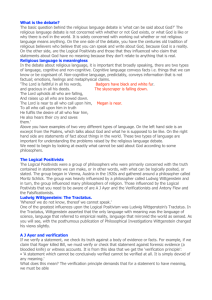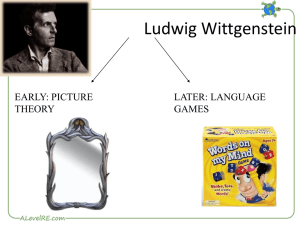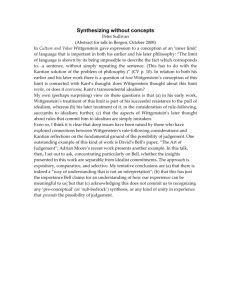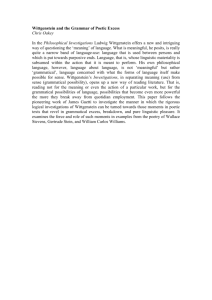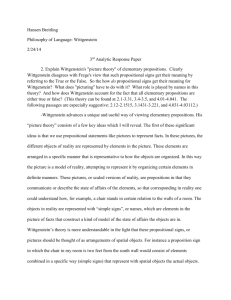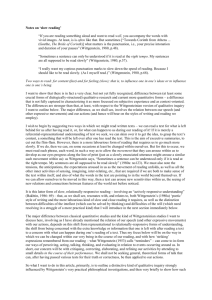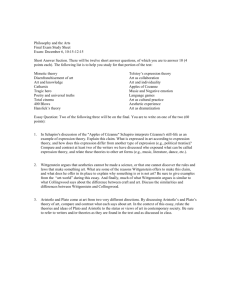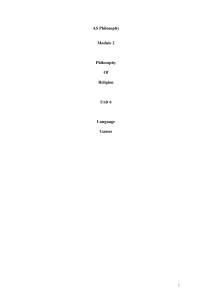2a) What is meant by “language games”
advertisement
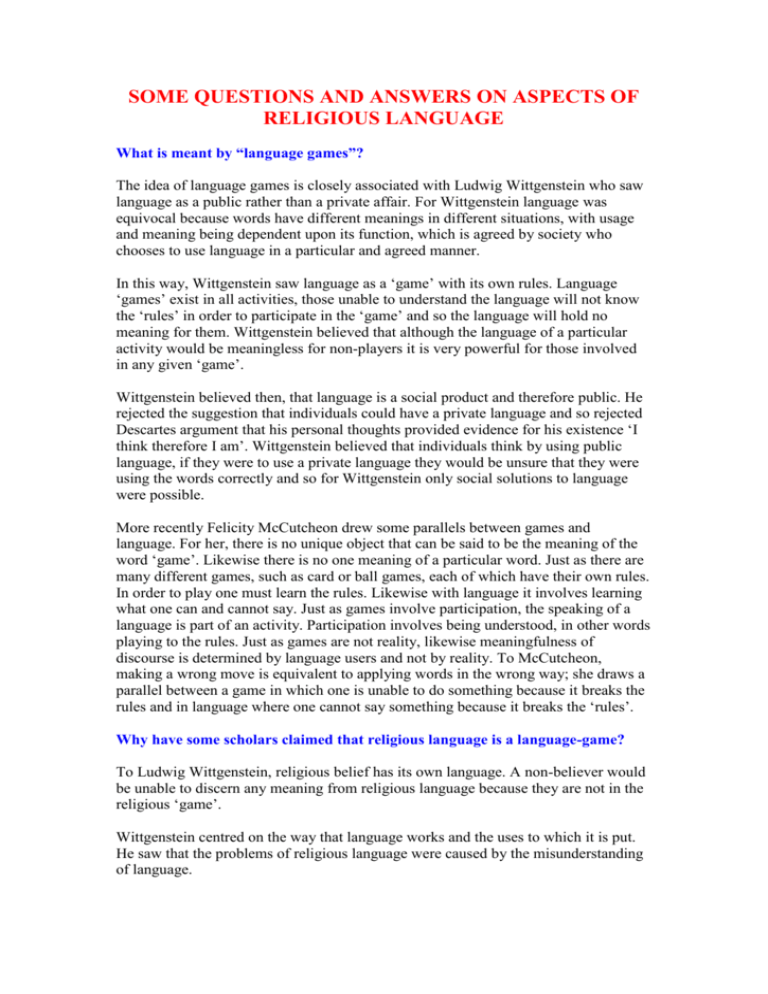
SOME QUESTIONS AND ANSWERS ON ASPECTS OF RELIGIOUS LANGUAGE What is meant by “language games”? The idea of language games is closely associated with Ludwig Wittgenstein who saw language as a public rather than a private affair. For Wittgenstein language was equivocal because words have different meanings in different situations, with usage and meaning being dependent upon its function, which is agreed by society who chooses to use language in a particular and agreed manner. In this way, Wittgenstein saw language as a ‘game’ with its own rules. Language ‘games’ exist in all activities, those unable to understand the language will not know the ‘rules’ in order to participate in the ‘game’ and so the language will hold no meaning for them. Wittgenstein believed that although the language of a particular activity would be meaningless for non-players it is very powerful for those involved in any given ‘game’. Wittgenstein believed then, that language is a social product and therefore public. He rejected the suggestion that individuals could have a private language and so rejected Descartes argument that his personal thoughts provided evidence for his existence ‘I think therefore I am’. Wittgenstein believed that individuals think by using public language, if they were to use a private language they would be unsure that they were using the words correctly and so for Wittgenstein only social solutions to language were possible. More recently Felicity McCutcheon drew some parallels between games and language. For her, there is no unique object that can be said to be the meaning of the word ‘game’. Likewise there is no one meaning of a particular word. Just as there are many different games, such as card or ball games, each of which have their own rules. In order to play one must learn the rules. Likewise with language it involves learning what one can and cannot say. Just as games involve participation, the speaking of a language is part of an activity. Participation involves being understood, in other words playing to the rules. Just as games are not reality, likewise meaningfulness of discourse is determined by language users and not by reality. To McCutcheon, making a wrong move is equivalent to applying words in the wrong way; she draws a parallel between a game in which one is unable to do something because it breaks the rules and in language where one cannot say something because it breaks the ‘rules’. Why have some scholars claimed that religious language is a language-game? To Ludwig Wittgenstein, religious belief has its own language. A non-believer would be unable to discern any meaning from religious language because they are not in the religious ‘game’. Wittgenstein centred on the way that language works and the uses to which it is put. He saw that the problems of religious language were caused by the misunderstanding of language. Wittgenstein believed that philosophical problems about language are created by not understanding that words can be used in different language-games. Hence his statement ‘philosophical problems arise when language goes on holiday’. To develop the point, Wittgenstein gave the example of the problems associated with the word ‘soul’ and argued that these problems are caused by trying to see the soul as some sort of physical object. The problems, according to Wittgenstein, would disappear if it was realised that the ‘physical object’ games does not apply to the soul. D.Z. Philips, a theologian who follows Wittgenstein’s approach, argues that the statement ‘God is love’ is not a description, but a rule for how the word ‘God’ is to be used. This means that statements about religious belief are really descriptions of the grammar of the religious language game and the implication of this is that something cannot be both a rule of grammar and at the same time a description of reality. Evaluate other scholars’ arguments for rejecting this claim. The criticisms of seeing religious language as a language ‘game’ include the observation that according to this claim, people in different faiths and denominations are playing different language games, therefore it would not seem possible for any discussion to take place between the different faith traditions about God’s existence, but this is obviously not the case. Religious believers are also involved in other language ‘games’ because they are involved in other aspects of life such as working and socialising. This means that religious language is not totally isolated, which suggests that there will be common ground between religious language and other language ‘games’. This common ground means that non-believers are able to understand religious language and decide whether or not it holds any meaning for them. It could also be argued that non-believers may actually be able to understand religious language better than believers. This is because non-believers possess an objective view of the use or religious language. Regardless of religious standpoint, one must appreciate that any talk about God is going to create difficulties. The meaning of the word ‘god’ applies to a being beyond human understanding. Whilst this means that any discussion of God is going to be limited, one can certainly use the approach outlined in ‘language games’ to establish that religious language does have some meaning or purpose, although as the criticisms put forward show, the extent to which this is the case is still very debatable. In what ways has the meaningfulness of religious language been challenged by twentieth-century empiricism? A group of philosophers that included Rudolf Carnap and leader Moritz Schlick, and was known as the Vienna Circle tried to understand how we use language as a means of conveying knowledge, and they produced what has become known as Logical Positivism. Its fundamental principle is that only propositions that can be verified hold meaning. This is an example of the empirical tradition of philosophy, which has emphasised the literal picturing function of language, because empiricist philosophers want to relate everything that is said to the ‘facts’ as they can be experienced. The logical positivists only accepted two forms of verifiable language; analytical language through which to deny the propositions within a statement would be a contradiction and synthetic propositions by which knowledge could be proved to be true or false by some form of sense or experiment, in other words through empirical means. This became known as the Verification Principle and it maintained that if it is not possible to know how to prove a statement true or false, then the logical positivists regard it as meaningless because it is not logical to make such a statement. In this way they argued that any talk of God was pointless because it was not possible to know the conditions under which any propositions relating to God could be proved true or false. So for logical positivists religious language has no meaning at all, because it talks about things that cannot be proved using empirical evidence. The work of the Vienna circle was made widely known by A J Ayer. The impact on the philosophy of religion was quite traumatic, for what Ayer and the Vienna Circle was saying was not just that God did not exist, but that all talk about God was meaningless. Ayer was a logical positivist, believing that empirical methods have to be used to assess whether a proposition is in fact verifiable and therefore meaningful. He felt that religious propositions cannot be analysed using empirical methods used to support a scientific theory, and so are meaningless. For Ayer, the statement ‘God exists’ cannot be either true or false, because there is no empirical evidence that can be produced to prove the matter one way or the other. This does not threaten all language about religion as much of it is intended to be taken literally and so causes no problems. Statements such as Catholic priests are celibate can be understood and there is evidence to support it, there is therefore no problem with this and other statements of a descriptive nature. However, for a logical positivist, problems begin to develop once one tries to get beyond such literal descriptions. In other words the empirical tradition in language believes that every word must picture something ‘out there’ which may be experienced. If this is not the case, then it is meaningless. For those who subscribe to this empirical tradition, much religious language cannot be experienced and so is meaningless. How have such challenges been met and with what degree of success? Many philosophers have rejected the Verification Principle by raising a number of objections. Some have claimed that the principle itself is not meaningful because it cannot be verified using the Verification Principle. The Verification Principle sates that ‘the meaning of a statement is its method of verification’, this is not analytical and so cannot be shown to be true on logical grounds. Nor is there any piece of evidence that can count for or against its truth and so by its own argument is therefore meaningless. In reply to this challenge, logical positivists point out that the verification principle is not making a factual claim but simply a recommendation for the way in which words should be understood, however, if logical positivists maintain that that its recommendation is correct with no need for an empirical basis, it would seem to undermine its assertion that language needs to be verified through such means so as to have meaning. As it has been shown, logical positivists reject religious language because there is no way of verifying it. However, the philosopher John Hick argued that when one dies the truth of God’s existence will be proven to be either true or false, in other words it will be verified. Hick called this ‘eschatological verification’. He is making the point that as we do know how to verify propositions such as ‘God exists’, religious statements do have meaning. Also, A J Ayer realised that some scientific and historical propositions are accepted even though they have not been verified with certainty, and so he created what we called ‘weak’ and ‘strong’ forms of verification. Strong verification occurs when there is no doubt that a statement is true, as it can be verified through sense experience. The weak form of verification holds that a statement could be verified if there is some sense experience that could count towards them, and in this way, the weak form of verification would support some religious statements. For example, the proposition ‘God is the creator’ could be supported by the evidence of possible design in the world. In the same way, there is historical evidence that counts towards propositions such as ‘Muhammad is the Prophet of Allah’ or ‘Jesus rose from the dead on the first Easter Sunday. So therefore in some cases the weak form of verification could be used to support and not discredit religious statements. In many ways, the arguments of the logical positivists have not so much been refuted, as bypassed. Towards the middle of the twentieth century, especially under Wittgenstein’s work, there was a growing recognition that giving a literal interpretation of the world was a small part of the task of language, and that its many other functions, for example, making jokes or giving commands, required a very different approach and so in the context of religious language the verification principle could perhaps be seen to be inapplicable, assuming of course that one believes that religious language does not seek to give a literal interpretation of the world.
